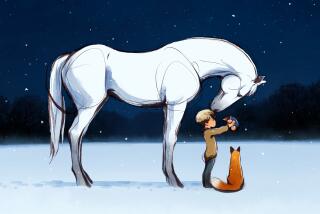A Celebration of Magic in a Child’s Make-Believe World
- Share via
M.E. and Morton by Sylvia Cassedy (Crowell: $12.95; ages 9-12; 312 pages)
With the publication of “M. E. and Morton,” a wise, vivid, inspirational novel, Sylvia Cassedy, author of the highly praised “Behind the Attic Wall,” has handed down a second masterpiece.
I haven’t read a children’s book in a long time that plumbs a child’s dreamy sensibilities so palpably or portrays the imaginations of children with such lively, canny accuracy. To slip into these pages is to slip under the skin and into the mind of Mary Ella Briggs, to put on her perceptions as if playing dress-up. Her narration wields that kind of enchantment.
Despite her documentation of problems, Mary Ella’s story--which is a search for her identity--celebrates the sounds, smells, textures and enthrallments of a special childhood. And mostly it celebrates the art of make-believe. For Mary Ella, her brother, Morton, and their new friend, Polly, playing and pretending is no mere distraction from boredom or despair. It’s a way of life. It gets them into trouble, perhaps, but then it gets them out again.
“M. E. and Morton” is much about the power of make-believe, the imagination viewed as a treasure-trove that can ease the impoverishment of a child’s real-life circumstances. When Mary Ella plays “Poor Children,” she invents dolls out of cigarette butts who skate on patches of frozen sidewalk spit. Sometimes she pretends that she lives inside a sugar Easter egg with a family of miniature rabbits.
Instead of painting with her elegant new paint set, she imagines that the bottles of paint are girls named “Ecru” and “Heliotrope” and “Mauve,” who live in an orphanage under the tutelage of “Miss Gold” and “Miss Silver.”
Mary Ella--who wants everybody to call her M. E., who laces her sneakers upside-down in an effort to be different, who’s smart and goes to private school--is a loner, considered a snob by the public school kids in her slightly shabby neighborhood. But mostly her sense of being an outsider is derived not from who she is but who her brother is: “The dumbest kid on the block,” 14 years old and still in seventh grade. “ ‘Morton without the T,’ ” Mary Ella chants derisively.
What’s genuinely poignant about Morton is his utter lack of defense. Obedient, innocuous, Morton is disparaged by almost everyone in the book, including his frustrated parents. Yet he’s no simple-minded victim. Our compassion for him arises not so much from the cruelties he suffers, but his resiliency. Though handicapped, he is rendered with as much dimension and grace as any other character.
The Mysterious Polly
Perhaps the most remarkable character--because she remains so mysterious--is Polly, the new girl, who appears one day like a pint-size Mary Poppins, dragging a stick of chalk along the iron pickets of a fence, leaving marks that look “like a message spurted out by a sky-writing plane.”
Polly wears a small adhesive bandage on her forehead, an enormous Gypsy skirt and purple lipstick, and her hair is bundled back with package string. While M. E. observes her, mesmerized, longing to be her friend, Polly snaps a leaf from the privet hedge and eats it.
Polly has other tricks, too. She writes notes and mails them to friends who live in the sewer. She’d just as soon suck on a rolled-up sock as eat a piece of bread. She orchestrates bug races on the ceiling of her grandmother’s apartment. She tells everyone that she’s magic. Perhaps her greatest trick of all is loving Morton and M. E. the same. And as M. E. struggles to comprehend how this could be, she finds herself changing, unriddling inequities of love that she perceives within her family.
Near the end of the book, after a terrible accident that Polly causes and then, miraculously, reverses, M. E. concludes that Polly is magic.
“Not the wand kind or the trick kind either. Not that. The other kind; the kind of magic that can make things wonderful.”
With her invention of such a wonderful book, I suspect Sylvia Cassedy is magic, too. She has created distinctly irrepressible characters whose triumph is their ability to cope with limitations.
Gingher’s most recent young adult novel is “Bobby Rex’s Greatest Hit” (Atheneum).
More to Read
The biggest entertainment stories
Get our big stories about Hollywood, film, television, music, arts, culture and more right in your inbox as soon as they publish.
You may occasionally receive promotional content from the Los Angeles Times.









